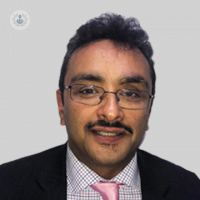The importance of breast cancer self examination
Written by:In his latest online article, Dr Hafiz Algurafi gives us his expert insight into breast cancer. He explains how women can perform a breast exam on themselves, the risks and what we can do at home to reduce the risk of breast cancer.

When and how should people perform a breast self-exam?
Premenopausal women, should be doing a breast exam or performing a breast exam about three to five days after their period finishes on a monthly basis. Women who have gone through menopause, should also be checking, but just on a monthly basis at a fixed time. The rationale for doing it at certain periods, is that the breast texture and consistency changes per month, every month.
The most important thing is essentially inspecting yourself by:
- checking symmetry
- checking for swelling
- checking inversion
- checking skin rashes
Doing this helps us to see if there’s any difference from the norm. Women who do this on a monthly basis get a good understanding of what is normal for them.
This examination should be done with:
- Hands by the sides in front of a mirror and checking for the different factors listed above
- The arms above their head
- The arms flexed on their hips and squeezing on their hips so that the chest wall flexes.
Inspecting your breasts in those three different ways is probably the most accurate way of assessing if there is something different from usual.
We want to be able to examine the breast, and that's called a palpation. The best position to do this, is lying flat because it distributes the breast and flattens it.
It should be done by:
- Putting your right arm by your side, then lying flat.
- Bringing the left hand onto the right breast.
- Then in a circular motion using the middle three fingers you palpate around the breast.
- Repeat this process on the left breast.
It doesn't matter whether you do it from out to in or in to out as long as the whole breast is palpated. This includes the area from the middle of the chest or the sternum, the pigeon bone, all the way to the armpit and above all the way to the collarbone. The order in which it's done is not so relevant, but the palpation needs to be initially quite light and then a little bit firmer and then a little bit firmer again until your breast tissue is being essentially pushed against the underlying ribs.
This is something that's really important because once you know how to do it, it becomes a routine and women do pick up lumps by self-examination so they can alter their prognosis.
How does a woman's menstrual and reproduction history affect her risk for breast cancer?
We know that the longer a woman is exposed to her menstrual cycles, the more there is in terms of exposure to oestrogen, which is one of the drivers that can trigger breast cancer.
Women who start their periods very early, especially before 12 years of age and women who stop their periods and go through the menopause at more than 55 years of age, tend to have a higher risk of breast cancer because they have been exposed to oestrogen longer.
That's why conversely, women who have less periods, those who have multiple pregnancies, especially early pregnancies and those who breastfeed, tend to have a lower risk of breast cancer.
What type of chemical and environmental exposures are linked to breast cancer?
The chemical and environmental factors are well known to people already and they include:
- smoking- active or passive
- dietary factors such as processed meats
- alcohol consumption
- air pollution
- exposure to gasoline
- exposure to pesticides
Is low vitamin D also a risk factor?
Much recent research has shown that there is a link between low levels of vitamin D and breast cancer. This is because vitamin D is believed to play a role in regulating cancer growth, cell growth and also regulating the spread of cancer. Vitamin D is important for bones and the immune system. It is a vital vitamin and you can increase your levels by:
- Spending fifteen minutes in the sun 2-3 times a day, three times a week
- Taking vitamin supplements- D3
- Diet- fatty fish, eggs and fortified milk
What can people do at home (diet or exercise) to lower their risk of breast cancer?
Physical activity is important and it can reduce the risk of cancer by 20%. In those who have or have had cancer it can reduce the risk of it coming back, reoccurring or spreading. In terms of diet avoiding smoking and reducing alcohol can also help to reduce the risk of cancer.
Dr Hafiz Algurafi is a highly esteemed consultant medical and clinical oncologist with over 25 years of experience in his field. You can schedule an appointment with Dr Algurafi on his Top Doctor’s profile today.


